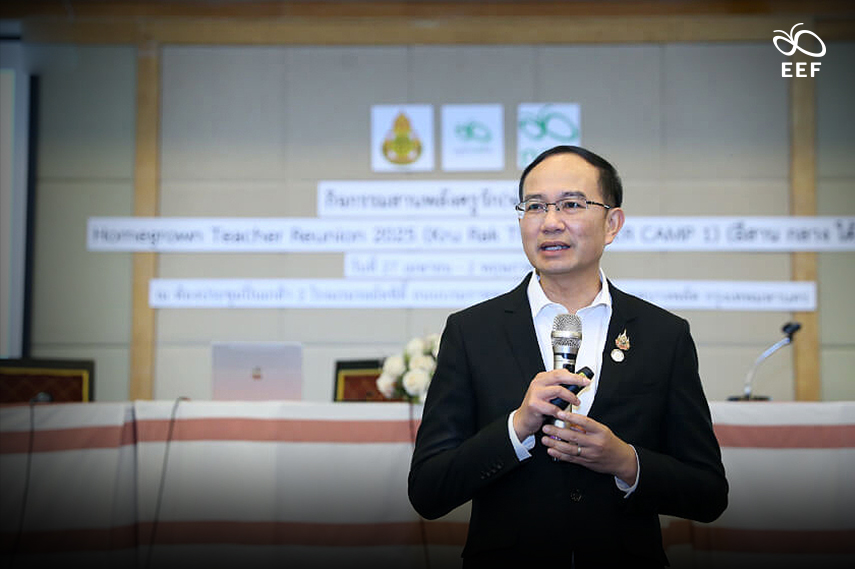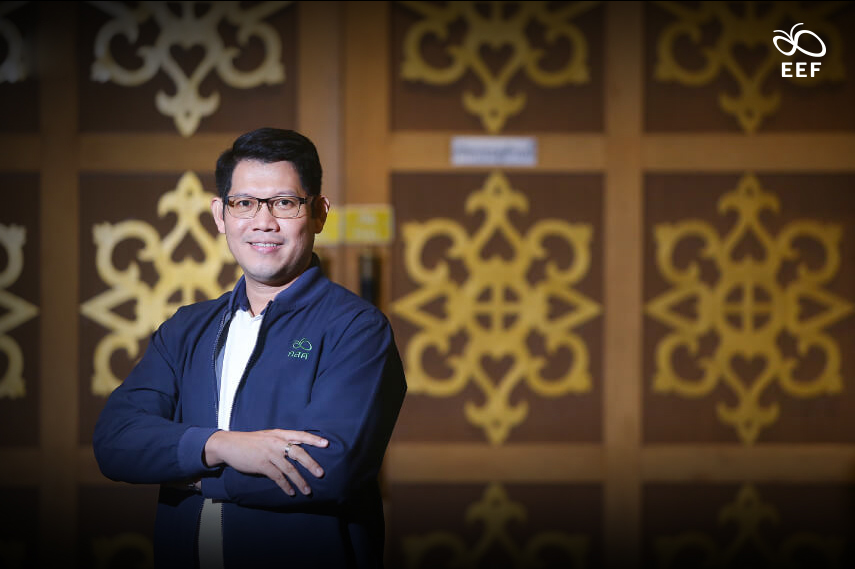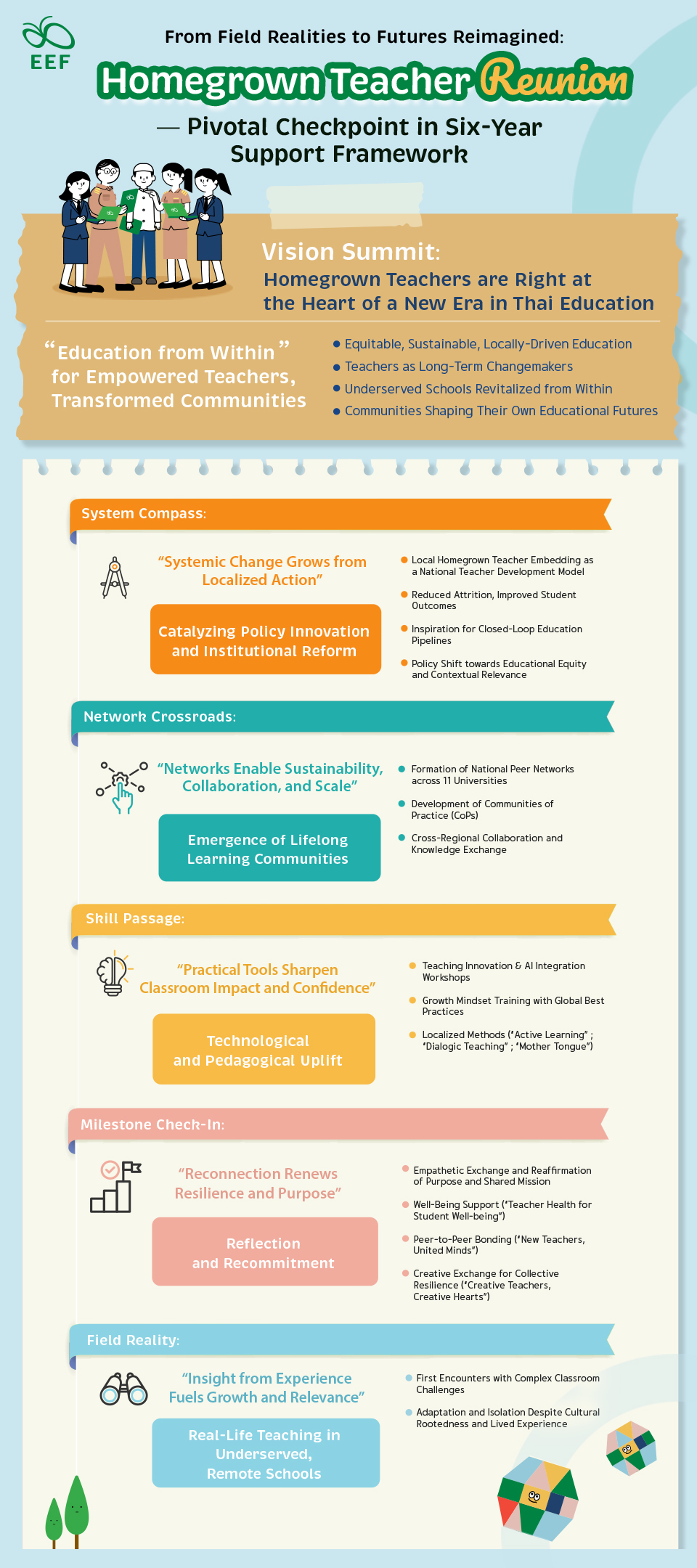
In May 2025, the Equitable Education Fund (EEF) Thailand convened the “Homegrown Teacher Reunion 2025” at Bangkok’s Royal City Hotel, welcoming 327 first-cohort homegrown teachers from across the country. This landmark event marked the first gathering since these educators began their service in remote schools, offering a much-needed moment of reflection, reconnection, and renewal. Over three days, the participants shared lived experiences, engaged in professional development, and rekindled the collective spirit that drives Thailand’s vision for educational equity. Representatives from the EEF and partner institutions delivered keynote addresses that inspired fresh thinking, reinforced resilience, and strengthened the foundation for future communities of practice.

The event opened with a heartfelt welcome by Associate Professor Dr. Prawit Erawan, Secretary-General of the Education Council, who also served as the event’s moderator. His opening remarks offered both encouragement and a powerful reminder of the mission at hand. Emphasizing the profound impact of “the life of being a teacher,” he underscored the role educators play in uplifting children and their communities. He reaffirmed that homegrown teachers are not just employees, but national hopes, carefully selected and nurtured to serve specific communities with deep understanding and long-term commitment.
Highlighting the Homegrown Teacher initiative as a visionary policy, the Minister outlined how it supports local students through secondary and tertiary education with rigorous courses and supplementary activities designed by a multidisciplinary team, preparing them to return as professionally trained educators. These graduates, he noted, carry both the responsibility and privilege of transforming early childhood education, a formative stage critical for shaping lifelong skills, values, and characters. “A teacher must think deeply, speak wisely, act with restraint, and radiate positivity. These qualities serve as both shield and sword, helping them meet challenges and thrive in their vital roles,” he concluded.
Building on this vision, Dr. Prawit Erawan reminded the participants that while they have reached a key milestone, the path of self-improvement must remain unending. “In a world that never stops evolving, teachers must continually seek new knowledge to guide students through change,” he urged. Lifelong learning, he stressed, is not optional but essential to responsive and relevant teaching.

Dr. Udom Wongsingha, Director of the EEF’s Teachers and Schools Quality Development Office, framed the reunion as a pivotal checkpoint in a six-year support framework designed to accompany teachers from graduation through early career development. More than a celebration, this gathering was an opportunity to consolidate insights from the field, equip educators with new tools for the upcoming semester, and refine the support system for future cohorts. “This is more than a reunion; it’s a collective pause to reflect, reconnect, and reimagine the roles these teachers play across Thailand’s diverse educational landscapes,” he explained.
One resounding call emerged from the participants across regions: the urgent need to enhance technological fluency, especially in leveraging AI in the classroom. In response, hands-on “Teaching Innovation” workshops enabled peer exchange and practical exploration of AI-integrated pedagogy. These sessions not only built confidence in using new tools but also sowed the seeds of a national network, a dynamic alliance of graduates from 11 institutions, bound by a shared commitment to area-based education. Early bonds formed here are expected to evolve into communities of practice that transcend geography and drive systemic, sustainable change in rural education.

Complementing these sessions, the “Growth Mindset” program—led by Paul Collard, founder of the UK-based Creativity, Culture and Education (CCE)—offered the participants new pedagogical frameworks rooted in global best practices. Emphasizing methods such as Active Learning, Dialogic Teaching, and Mother Tongue instruction, the program tailored these approaches for real-world application in remote contexts. Designed to empower teachers as agents of change, the sessions renewed both instructional strategies and personal resolve.
Equally vital was emotional dimension. The participants engaged in restorative activities designed to “heal the heart” and sustain them through the solitude of remote placements. These included wellness sessions under the banner “Teacher Health for Student Well-being,” as well as bonding initiatives like “New Teachers, United Minds,” and the creative exchange circle “Creative Teachers, Creative Hearts,” which encouraged peer-to-peer support and collective resilience.

In essence, the Homegrown Teacher Reunion 2025 was both symbolic and strategic, an inflection point in Thailand’s educational journey. Through visionary addresses, skill-building workshops, and emotional support, the event not only expanded pedagogical capacity, but also rekindled a sense of mission. More than a gathering, it marked the emergence of a national network of committed educators, united by shared challenges, common goals, and a long-term vision to transform Thailand’s most underserved schools from within.
While the full impact of this initiative may not yet be visible after just seven months, its long-term potential is already evident. By the second academic year—and increasingly over three, five, or ten—the results of this place-rooted teacher model are likely to become unmistakable. Selecting and embedding teachers within their home communities significantly reduces cultural dissonance, shortens adaptation time, and lowers attrition rates. This smoother transition enhances classroom continuity, accelerates school development, and fosters deeper student engagement. Over time, such localized learning environments could yield meaningful, community-driven progress in education.
If this model continues to prove successful, its impact may extend far beyond improved outcomes in remote schools. It has the potential to catalyze a nationwide shift in teacher education, prompting institutions to adopt closed-loop development models and positioning local embedding not merely as a best practice, but as a national imperative. In this way, Thailand edges closer to an educational system that is equitable, sustainable, and built from the inside out, by the very communities it seeks to serve.
All For Education is all about people; only when all is in for education is Education For All. Join the movement to reduce educational inequality. Support the EEF by donating to fund research, partnerships, and assistance for children, youth, and adults in need of educational support. Click the link to contribute today and help create a society where education is open and equal for all. Together, we can make a lasting impact.

